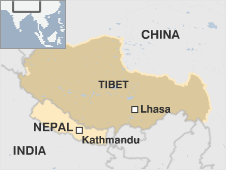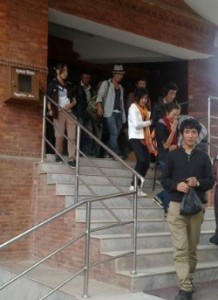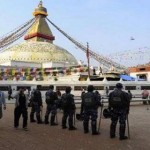 Nepal has announced that it will cease to issue identity cards to Tibetan refugees in a move which raises concerns that Tibetans in Nepal will be forcibly and illegally repatriated. Shes Narayan Poudel, chief of the National Commission for the Coordination of Refugees in Nepal, said “We have decided to no longer provide identity cards to Tibetan refugees. If we continue to recognise them as such, we will face new waves of immigration. And we have no more space.”
Nepal has announced that it will cease to issue identity cards to Tibetan refugees in a move which raises concerns that Tibetans in Nepal will be forcibly and illegally repatriated. Shes Narayan Poudel, chief of the National Commission for the Coordination of Refugees in Nepal, said “We have decided to no longer provide identity cards to Tibetan refugees. If we continue to recognise them as such, we will face new waves of immigration. And we have no more space.”
Nepal’s announcement to discontinue identity cards for Tibetans comes at the same time as China announced an additional 20 million Yuan (US $3.25million; GB £2million) of aid for Nepal. The development aid comes with the proviso that the Nepalese government control any “anti-China” activities in Nepal. China is now a major donor for the development of a country which has struggled to maintain a stable government, and Kathmandu has agreed to conform to China’s demands and uphold the One-China policy.
Since as far back as 1959 when the Dalai Lama fled China to India, Nepal has been the gateway for Tibetan refugees fleeing persecution. A Gentleman’s Agreement between Nepal and the office of the United Nations’ High Commissioner for Refugees (UNHCR), put in place in 1989, allows Tibetan refugees reaching Nepal’s borders entry and safe passage to India where they can obtain refugee status. Currently there are around 20,000 Tibetans in Nepal with until recently, on average, 2000 Tibetan refugees entering each year. However only 200 new Tibetan refugees were recorded as entering Nepal in 2013 and critics argue that increased cooperation between Chinese and Nepali border security forces has made it possible for China to stem the flow of Tibetan refugees.
It is illegal under international law for Nepal to forcibly repatriate Tibetan refugees because of the risk of torture or persecution in China. However a recent Human Rights Watch report Under China’s shadow: Mistreatment of Tibetans in Nepal highlights “significant concerns that Nepal may at times forcibly return Tibetan refugees to China”. News site Phayul writes that in 2003, 18 adult Tibetan refugees with children were handed over to Chinese authorities in Tibet.
Brad Adams, Asia director at Human Rights Watch says, “The situation for the Tibetan refugee community in Nepal has markedly deteriorated since China’s violent crackdown on protests in Tibet in 2008. While Nepal continues to offer some protections to Tibetans, it is succumbing to Chinese pressure to limit the flow of Tibetans across the border and imposing restrictions on Tibetans in violation of its legal obligations. The withdrawal of identity cards for Tibetans will further exacerbate the precarious situation of Tibetan refugees in Nepal. Brad Adams agrees, “Nepal continues to deny thousands of Tibetans, most of them born in Nepal, any legal existence by refusing to issue them any form of official identification. This fuels a pattern of marginalisation and abuse of the Tibetan community at large.”
The United Nations has urged Nepal to register Tibetans, saying that the lack of documentation puts refugees at risk.






 Print
Print Email
Email